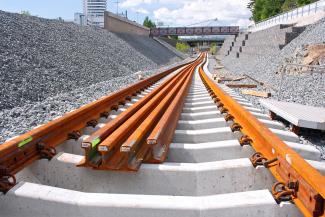The Diploma of Engineering Infrastructure (Rail) takes your rail infrastructure experience and turns it into formal recognition. Engineering consultant Tim McLean's experience has proved just that.
Tim is part of a small team in a busy surveying and engineering practice in Tamworth, NSW. With several years of railway infrastructure experience, Tim's background is in environmental engineering and planning. He's no stranger to engineering though, with an undergraduate degree in engineering technology. Tim and his colleagues have diverse experience but aren't registered engineers. This means that they have difficulty obtaining Category B Engineering Authority from TfNSW (or similar).
Enter the bridge between experience and qualification – the Diploma of Engineering Infrastructure (Rail). The nationally accredited Diploma is delivered by the University of Tasmania (UTAS) in partnership with Engineering Education Australia and Transport for NSW. The Diploma ticks all the boxes as an outstanding professional development opportunity. Students love the flexible learning model, plus the chance to learn alongside rail track colleagues.
Tim spoke with us recently about his reasons for studying the Diploma – and what he’s discovered so far.
Finding the skills to stand out
Tim’s employer works with major contractors and TfNSW. The business focuses on regional rail track survey and design, bringing track and associated infrastructure up to current standards. This also means designing level crossings and intermodal connections such as road approaches.
For many regional engineering firms, multi-skilling becomes essential to stay relevant. Often you need ‘boots on the ground’ and you don’t have the luxury of multiple consultancies in one place.
Tim remarks, “We’ve got three or four firms in town that do similar work, but you start going west and even those numbers drop off pretty rapidly”.
Tim and his colleagues knew of the gap in formal training and recognition of foundational rail track engineering skills. Last year, they learned about the unique Diploma through industry emails. When the opportunity came up to enrol, Tim and a colleague “didn’t second-guess it, we just jumped straight into it. We needed to formally validate what we know.” The multi-skilling approach is a clear advantage in a regional area.
Eye-opening learning
Tim started the course in early 2020 and already Tim has been struck by the depth of learning. He’s appreciating new knowledge about ‘the bigger picture’ of track engineering and rail infrastructure.
“It’s opened my eyes to just how expansive the industry actually is. For example, being regionally based, we don’t deal with metro issues like electrification and overhead wiring. It’s been really good to understand the complexities that my colleagues deal with.”
Flexible delivery, expert teachers
Tim says the learning resources have been excellent and they’re already been used in the office and on-site. He also admires how the lecturers teach effectively from their wide rail industry experience.
“The Diploma has fantastic lectures. They’re knowledgeable and happy to help out wherever they can. They’re also great at passing on their knowledge.”
Although this has been Tim’s first fully online learning experience, it hasn’t held him back at all. The Diploma has provided more than enough flexibility to continue full-time work while Tim studies. Networking opportunities are an added bonus that has already resulted in increased work for the firm.
“We’ve been able to network online with other students in the course who are with companies we work alongside. Through our study, we’ve actually built a better relationship and are doing more mutual work.”
Improved career opportunities
Putting in the effort to gain a tertiary qualification has to pay real dividends in career advancement.
Although the higher qualification is Tim's primary reason for study, the Diploma has benefits that will open doors for his career down the line.
“Building this foundation of rail track infrastructure knowledge means I can choose different avenues in an engineering or rail career. It will allow me to diversify my skill set and be more flexible in my future career. Particularly in regional Australia, that’s the way of the future.”
Get your career on a new track
The Diploma of Engineering Infrastructure (Rail) is ideal for practicing engineers and technicians who work in rail-related industries, as well as engineering graduates looking to specialise in this field. Enrolments are available through UTAS. Find out more about eligibility and requirements.
